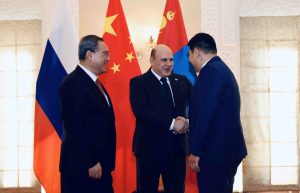On October 16, Mongolian Prime Minister Oyun-Erdene Luvsannamsrai attended the 23rd Meeting of Shanghai Cooperation Organization’s (SCO) Council of Heads of Government in Islamabad, Pakistan. While there, Oyun-Erdene took part in a trilateral summit with Russian Prime Minister Mikhail Mishustin and Chinese Premier Li Qiang, and urged Mongolia’s neighbors to accelerate joint mega projects.
The organizing of the China-Mongolia-Russia heads of government trilateral summit was initially proposed by Oyun-Erdene during the previous SCO heads of government meeting in Bishkek, Kyrgyzstan. China, Mongolia, and Russia have long held frequent trilateral meetings at the head of state (presidential) level at SCO gatherings, but this year failed to secure such a summit.
Instead, the first trilateral summit between the countries’ prime ministers aimed to tackle government-to-government issues and find ways to enhance cooperation. There are plans to make the head of government summit into an annual event, with the next meeting planned for 2025.
According to the Montsame News Agency, “The Heads of Government agreed that institutionalizing this level of trilateral meetings between Mongolia, China, and Russia is not only key to activating tangible trilateral cooperation and advancing major strategic joint projects but is also in line with the common regional interest of peace and sustainable development of Asia.”
To Mongolia’s new government, now is a critical time to push forward economic activities. Oyun-Erdene was reinstalled as prime minister in July, following Mongolia’s general election.
During the trilateral summit, Oyun-Erdene underscored Mongolia’s economic priorities, which include expediting the implementation of economic projects between the three countries. The 2016 China-Mongolia-Russia trilateral economic corridor has not been fully implemented to date.
Oyun-Erdene stated, “Among the 33 projects, the first priority is the building of the Zamiin Uud-Altanbuyag railways, which are the first major step of the establishment of the trilateral economic corridor.” He also mentioned the Russia-Mongolia-China trilateral gas pipeline, trilateral mechanisms for pursuing renewable energy, and aligning trilateral development between Mongolia’s Steppe Road, Russia’s Eurasian Economic Union, and China’s Belt and Road Initiative.
During the trilateral summit, Mishustin highlighted Mongolia-Russia comprehensive strategic partnership and Putin’s visit to Mongolia in September. “The Russian side pays great attention to expanding trade and economic cooperation with Mongolia,” Mishutin stated. “In particular, from January to August, our trade increased by 21 percent.”
In September, during Putin’s state visit to Mongolia, Mongolia and Russia signed multiple agreements, which included cooperation in mineral resources, environment and climate change, energy, and the health sector.
While the Mongolia-Russia comprehensive strategic partnership generally focuses on energy, China will also be a key player in balancing Mongolia’s energy sector, as it has been more active in promoting renewable energy than Moscow. But for the trilateral economic corridor to drive economic benefit for all three countries, Ulaanbaatar, Moscow, and Beijing must participate equally.
China’s Li Qiang was receptive of Mongolia’s push to accelerate economic activities. Li highlighted the Mongolian government’s economic policies and underscored the significance of its stability. That, he said, will have a positive impact on accelerating collaboration projects. In support of accelerating the implementation of joint projects, Li proposed to establish a medium-term roadmap for China-Mongolia-Russia cooperation.
The China-Mongolia-Russia trilateral summit is an important mechanism for all three governments to cooperate, especially in the increasingly challenging geopolitical environment. While Mongolia aims to gain economic benefits from trilateral joint projects such as the Power of Siberia 2 gas pipeline, the geopolitical reality may not allow such quick returns.
The Power of Siberia 2 pipeline envisions sending natural gas from western Siberia to northeastern China, with the pipeline transiting Mongolia. The project has received support at the highest levels, but the implementation process has already been influenced by growing insecurity in Northeast Asia and in the Korean Peninsula. At the same time, energy experts speculate that the growing production of green and renewable energy in China is the main reason why Beijing is taking its time on the trilateral mega-project.
Considering all these elements, trilateral cooperation between Ulaanbaatar, Moscow, and Beijing may need to shift form and transition to renewable energy.
China is leading the world in the green transition. As the 2023 International Energy Agency (IEA) report noted, “China commissioned as much solar PV as the entire world did in 2022 while its wind additions also grew by 66% year-on-year. Over the past five years, China also added 11 GW of nuclear power, by far the largest of any country in the world.”
Hence, Mongolia’s push for trilateral cooperation may include newer initiatives to increase investment and cooperation in renewable energy, critical minerals, and development of wind farms and battery storage – all important economic elements to Ulaanbaatar’s energy reform.
As Mongolia’s only two neighbors, Russia and China will continue to play an important role in Mongolia’s transition to renewable energy in the years to come. To some degree, Mongolia and China are already supporting each other’s climate change and desertification efforts.
Beyond the China-Mongolia-Russia trilateral summit, Mongolia’s participation at the SCO heads of government meeting in Islamabad created an opportunity for Mongolia and Pakistan to discuss bilateral relations.
During the bilateral meeting with Oyun-Erdene, Pakistani Prime Minister Shehbaz Sharif stated that Pakistan is interested in establishing an embassy in Mongolia. As it stands, Pakistan’s ambassador to China (current Ambassador Khalil Hashmi) is also concurrently Pakistan’s “non-resident ambassador to Mongolia.”
Oyun-Erdene and Sharif agreed to form a Joint Ministerial Commission to enhance cooperation on trade, tourism, agriculture and mining.

































